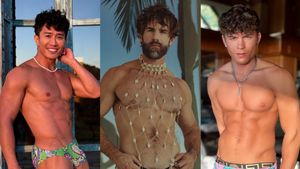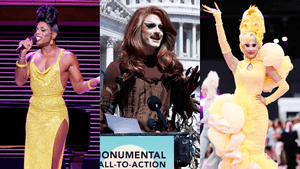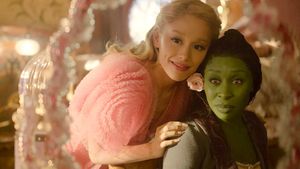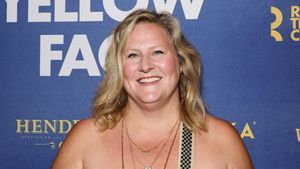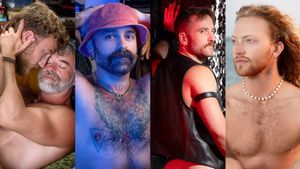Standing in front of 140,000 fans at London’s Wembley Stadium, performing with the woman who is arguably among the most iconic and successful pop stars of the 20th century, should have been a pinnacle of Carlton Wilborn’s professional life. He was one of Madonna’s lead dancers for The Girlie Show and Blond Ambition, two of her biggest concert tours, and two of the biggest tours overall of the 1990s. Rolling Stone called Blond Ambition a “sexually provocative extravaganza” and “the best tour of 1990.”
Blond Ambition wasn’t just a tour, though. It was a spectacle that, after it was filmed, became the most watched TV special to date for HBO (with 4.3 million households viewing), and it spawned the 1991 documentary Truth or Dare, which became not just a mainstream success (it grossed $29 million, making it one of the highest-grossing documentaries ever) but a bona fide gay hit. Two of her male dancers kiss, the troupe attends an LGBT pride parade, and Madonna pays tribute to her friend Keith Haring, who had died of AIDS complications in 1990. It is a very gay film that was as huge culturally as the concert series. And Wilborn was there in the midst of it all, in the film, performing onstage.
Carlton and Madonna on stage (below)
He had it all, but there was something off. Something not quite right. Perhaps because he was keeping a secret. “I’d get these grand opportunities—and now I’m touring the world and now I’m at Wembley Stadium with Madonna and we’re doing these grand things—and I had this huge secret that nobody knew about,” he recalls. “I don’t feel it so much now, but there was a somewhat recent feeling of sadness about that time for me in reflection, in that, man I was really not able to ever sit in the glory that my life was having because there was this on-the-down-low truth going on that was [stopping me from] feeling amazing and being really excited about what I had.”
One of the highlights of Wilborn’s professional experiences came during the Girlie Show tour. “Madonna created an eight-minute number that was exclusively a highlighted moment for me,” he says. “She was not on the stage. It was a piece that was set completely around me. I was the leader of the thing, and I had eight minutes to entertain 120,000 people.” But like all moments during those years—after Wilborn discovered he’s HIV-positive but before he told anyone—it was tempered. “Because as excited as I was, it’s 10:30 at night and the sound is booming and the audience is screaming for us, and I’m also aware that it’s 10:30 at night and we’re in a city or a country where it’s cool outside and all I have on is briefs, and God forbid I should be cold or get a chill. I’m fucked.”

An actor and dancer in his youth, now an actor, producer, writer, and motivational guru, Wilborn was diagnosed with HIV in 1985, at the height of AIDS hysteria, a time when even the president wouldn’t utter the term “AIDS” because it supposedly didn’t apply to good, decent people.
“For me, it was a crazy living nightmare, in a weird way,” admits Wilborn. “Again, I was diagnosed when it first landed in the consciousness of America, and it was fire and brimstone.” He got the news while in Hawaii on tour with Hubbard Street Dance Chicago. “I had been feeling a little uncomfortable and had gone to the doctor in Chicago,” he recalls. “Just, you know, saying, ‘I have a cold or the flu, I’m not quite sure.’ Then I go on tour and I’m in Hawaii and I check in with the doctor and his first thing he said is, ‘You should have a seat.’ And he said what he to this day—one of the best dance classes I’ve ever had. This other force was alive in me.”
Part of that force, Wilborn says now, is the relationship he has built with God. In 2000, still not out about his HIV status, he saw his life “really hit its serious rock bottom.” Work had dried up, so he got a job on a cruise ship as the dance captain and a performer. During the cruise, he bought a cross on a chain in Nassau, the Bahamas, because the kids were wearing them in hip-hop videos on MTV. Then a few months later he questioned the meaning of the cross. At the same time his sister sent him his childhood Bible, a relic he’d forgotten. A year later, Wilborn had developed a “real concentrated relationship with God,” and in 2004, he says, he was saved. (“What that means, to be saved,” he says, “is to accept and declare that Jesus Christ, for laymen’s term, is your template, is your model for how you go after life, and you surrender your life to this higher force that can take care of you better than you can take care of yourself.”) That moment began his “concentrated time with God that has turned my life into all that my life is now—and I love my life.”
Carlton on CSI: Miami (left)
 Today Wilborn is still a dancer, though he’s known equally well for his other work in entertainment. He won the best actor award in 2013 for his new film, The Boarder, at the New York Los Angeles International Film Festival. (The film is now touring the festival circuit prior to DVD release.) The Boarder tackles reactive attachment disorder, a mental health issue that affects children who’ve experienced trauma of some sort. “What’s been so amazing about this opportunity is we’re getting to shine a light on a condition that’s been really misdiagnosed for a lot of families and for a long time,” he says.
Today Wilborn is still a dancer, though he’s known equally well for his other work in entertainment. He won the best actor award in 2013 for his new film, The Boarder, at the New York Los Angeles International Film Festival. (The film is now touring the festival circuit prior to DVD release.) The Boarder tackles reactive attachment disorder, a mental health issue that affects children who’ve experienced trauma of some sort. “What’s been so amazing about this opportunity is we’re getting to shine a light on a condition that’s been really misdiagnosed for a lot of families and for a long time,” he says.
He’s also producing and starring in a film he wrote called Breakout, which he calls “my main baby right now.” The film is in pre-production, but the trailer, which screened at a handful of film festivals last summer, was nominated for best action sequence and best short film at the Action on Film International Film Festival. And he’s got a couple of scripted things in development and, of course, he’s still showing up on television from time to time, most recently as Marine Master Sgt. Charles Garrett on a January episode of NCIS.
When Wilborn first began acting, he was closeted about being gay. He landed his first role in a series (as one of the leads) with L.A. Firefighters on Fox, on which he played a very masculine, and straight, fireman. “I was making 15 grand a week and that was all fantastic, but the thing I was most excited about was that he was a butch dude and that I could now get everybody to think I was a straight guy,” Wilborn admits. His first day of filming caught him off guard, though.
“Here’s gay Carlton on the DL doing his thing,” he says, chuckling. “I’m going to show up and I’m going to be Mr. Flirty with all of the girls. There was an actress who was cast as one of the series regulars as well, and we’ve now got this energy that we’re doing all day long and we’re wearing it strong.” After a day of filming, they went to a bar and had a drink. “And some part of the mask is not wearing well for either one of us. I’m the first to be honest and say that I’m actually gay. And turns out she’s actually a lesbian. We frickin’ laughed about that so hard in that bar.” (That woman, by the way, was actress, later photographer, Alexandra Hedison, who would eventually come to fame as the woman Ellen DeGeneres left for Portia de Rossi.)
One of his 2012 performances, as a transgender woman named Glenda on The Mentalist, won Wilborn accolades from the LGBT community, and the episode was nominated for a GLAAD Media Award.
“I noticed every time that God really, really wants to take me to another level, he activates me through work, through a work opportunity,” Wilborn says. “So, you know, I’ve been gay, I’ve been with men, I’ve been with women, I like to be with women—but I’ve had my issues around [accepting cross-dressers and trans women] even though I’m kind of turned on by them. So here’s what’s interesting. I had a call from my manager saying there’s an opportunity to do this role and I’m like, ‘Oh, lord, are you kidding me?’ I breathe into it, I have my conversation with God and he’s like, Go for it. Women have always been my strongest allies. I thought, Carlton if you’re going to do this and you’re going to step into this female persona, you’ve got to do justice for the female race and for the trans race. And really honor it—don’t let it be something that’s caricatured.”
Carlton in Breakout (above)
 At his first costume fitting, Wilborn says, he discovered “a part of me that is a flamboyant man. I love my maleness. I’m very good in my man, but there’s a side of me that is very tuned in to his female.” But fear of being stigmatized as feminine, as queeny or flamboyant, and his own internalized phobia, “the part of me that’s still battling with ‘I don’t really want to be fully known as this thing,’ ” he says, “is doing all this extra conversation in the wardrobe room and, oh, my God, it’s so overwhelming.… It was such bullshit, it was so funny.” He took the high heels home to break them in and learn to walk in them, and it helped him face his own homophobia, Wilborn says. “All these years what I’ve been petrified of is the pointing finger going, ‘He’s a faggot, he’s one of them.’ So I’m like, OK, dude, you got to face this—and this person you’re about to step into has no shame on the game at all.”
At his first costume fitting, Wilborn says, he discovered “a part of me that is a flamboyant man. I love my maleness. I’m very good in my man, but there’s a side of me that is very tuned in to his female.” But fear of being stigmatized as feminine, as queeny or flamboyant, and his own internalized phobia, “the part of me that’s still battling with ‘I don’t really want to be fully known as this thing,’ ” he says, “is doing all this extra conversation in the wardrobe room and, oh, my God, it’s so overwhelming.… It was such bullshit, it was so funny.” He took the high heels home to break them in and learn to walk in them, and it helped him face his own homophobia, Wilborn says. “All these years what I’ve been petrified of is the pointing finger going, ‘He’s a faggot, he’s one of them.’ So I’m like, OK, dude, you got to face this—and this person you’re about to step into has no shame on the game at all.”
So the 6-foot, 2-inch Wilborn headed to Larchmont, an affluent area of Los Angeles filled with high-end boutiques and cafés, and put on those super-high heels and trotted around, to see what it felt like to at least walk in Glenda’s shoes. Wilborn says it was the beginning of “me getting right with my sexuality” and “coming around to fully embrace, to love all that I am.”
A month and a half later, Wilborn, now a life coach and motivational speaker as well as the author of the memoir Front & Center: How I Learned to Live There and the workbook I Am Empowered, got a text from his own life coach: In TV Guide, Mentalist executive producer Daniel Cerone, who also wrote the episode, “did this three-quarters page ad with three paragraphs speaking full on my behalf with every single kind of wordage that one would pay for as an endorsement. You know, ‘We needed a force of nature and after a long search we got lucky and found Carlton Wilborn.’”
Today Wilborn says those days of hiding his HIV status are long gone, and so are fears that standing in the cold in his underwear in front of hundreds of thousands of fans will send him into an immune spiral. “My health is absolutely fantastic,” he says. “My health is solidly strong. I mean, I’m on a cocktail and have been since around 2004. After a round of scrambling to find the right mix to keep me balanced, we happened upon this particular cocktail, and it has me undetected since 2004. Honestly, if I did not have to take meds every day, there is nothing to my physical being or my moods or anything that represents that I’m HIV-positive. I would not know that I’m HIV-positive.”
Wilborn is now all about living with love and courage and spirituality, examining the infinite possibilities that he never thought possible when he was a street-tough kid in Chicago giving disco lessons to the uptown kids and later as a young, sexually abused man, re-creating self-destructive patterns—including addictions to drugs and sex—instead of dealing with the ramifications of his abuse, which he talks about in Front & Center. He and the director of The Boarder are developing a scripted project inspired by his life story, and he’s starting a foundation this year called the We Are Gifts Foundation (GoFundMe.com/WeAreGifts), meant to empower sexually abused and HIV-positive youth. He hopes this year to mount the first full-day camp day, in which the kids will “use the different modalities of creativity to hone their voice.”
 They will act, dance, sing, write, all the things that helped Wilborn “free myself and find my voice.” That’s what saved him, and maybe now it can do the same for others. “The trauma lasted as long as it did because I kept my story dormant. So what I want to do is give children and youth an opportunity to celebrate their truth, to bring it to the light so that they can get freer sooner.”
They will act, dance, sing, write, all the things that helped Wilborn “free myself and find my voice.” That’s what saved him, and maybe now it can do the same for others. “The trauma lasted as long as it did because I kept my story dormant. So what I want to do is give children and youth an opportunity to celebrate their truth, to bring it to the light so that they can get freer sooner.”
Would he be where he is today—happy, healthy, and self-aware—had the virus not come into his life? Could it be that HIV not only didn’t end his life, but in fact saved it?
“I have come to the reality that I am actually grateful that HIV showed up in my space because it did add velocity to my character work,” says the empowerment expert. “Don’t think I would be as clean about myself…about how I want to deal with people, as clean about how I can perceive life, honestly, if HIV had not shown up, because I would be off and running. I probably would not honestly be here. I have really come to believe that all of my journey, the HIV, the angst, the issues, the cravings, the addictions, me being on the other side of that is so that I can have a voice that can speak to somebody else who is still stuck or still trying to unravel that part of their life. I didn’t make it just so I could celebrate and go, ‘Carlton’s now fabulous and look at how healthy I am’—it was never about that. My life is fantastic. I get to do all the things that I want to do, honestly. HIV helped me wake up and embrace love—love for myself, love for others.”
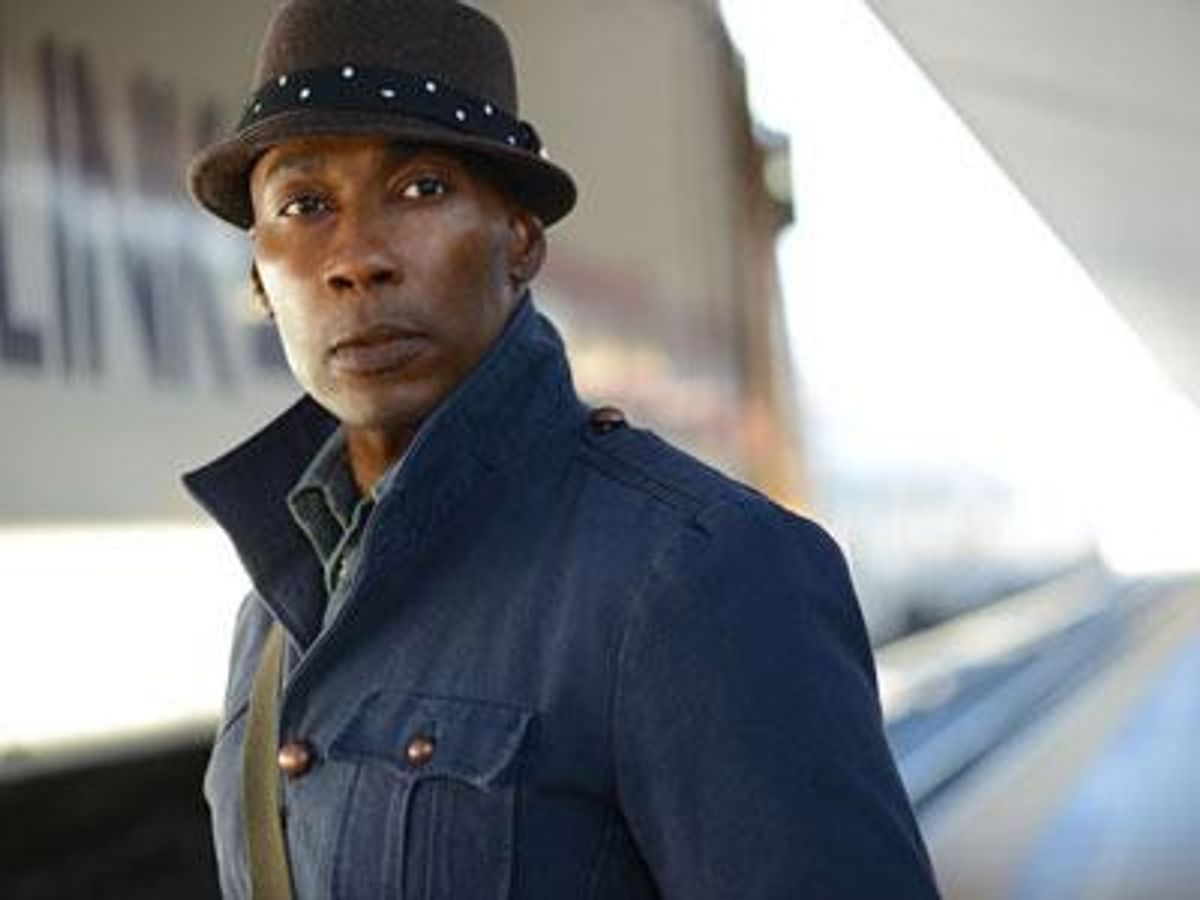

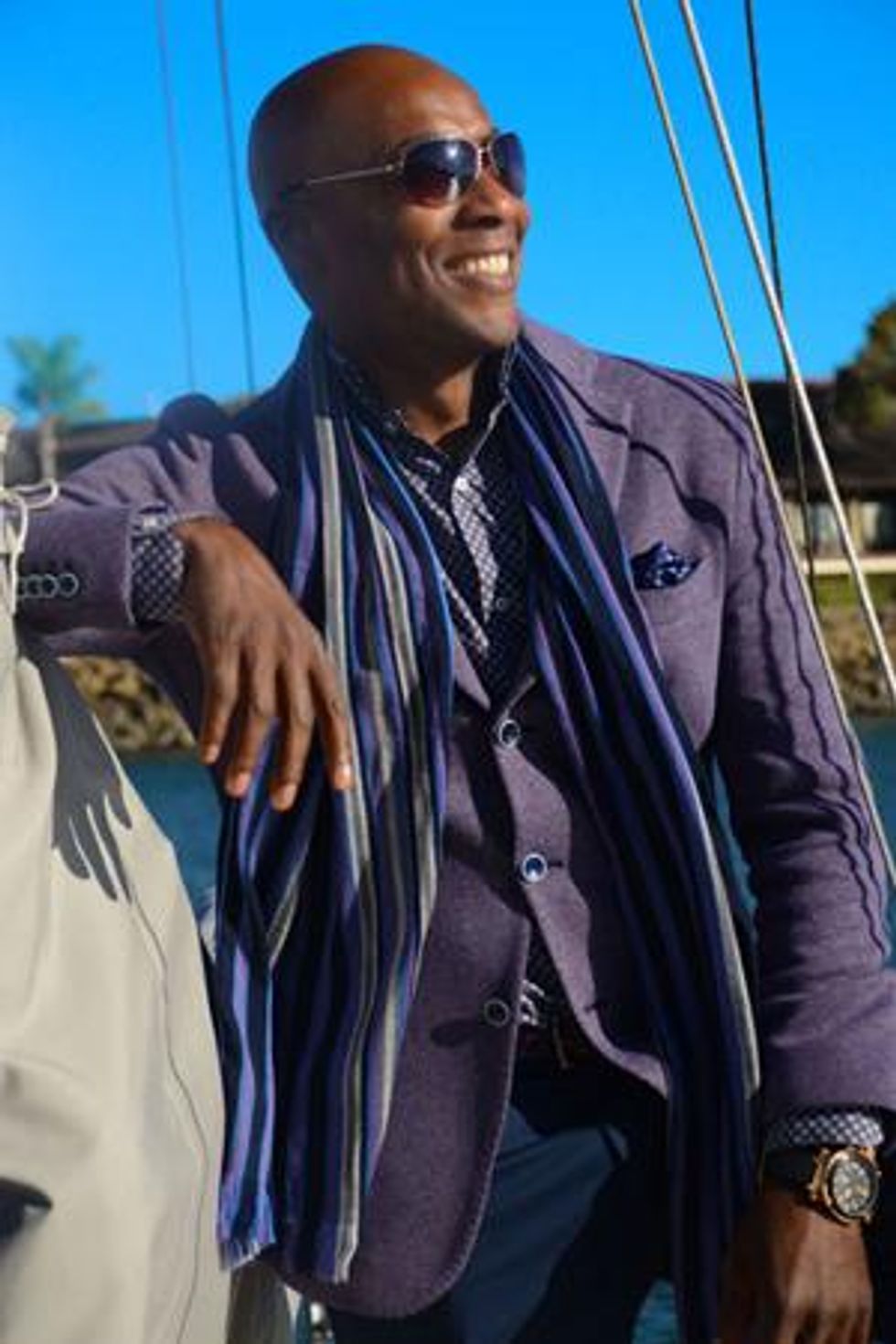 Today Wilborn is still a dancer, though he’s known equally well for his other work in entertainment. He won the best actor award in 2013 for his new film, The Boarder, at the New York Los Angeles International Film Festival. (The film is now touring the festival circuit prior to DVD release.) The Boarder tackles reactive attachment disorder, a mental health issue that affects children who’ve experienced trauma of some sort. “What’s been so amazing about this opportunity is we’re getting to shine a light on a condition that’s been really misdiagnosed for a lot of families and for a long time,” he says.
Today Wilborn is still a dancer, though he’s known equally well for his other work in entertainment. He won the best actor award in 2013 for his new film, The Boarder, at the New York Los Angeles International Film Festival. (The film is now touring the festival circuit prior to DVD release.) The Boarder tackles reactive attachment disorder, a mental health issue that affects children who’ve experienced trauma of some sort. “What’s been so amazing about this opportunity is we’re getting to shine a light on a condition that’s been really misdiagnosed for a lot of families and for a long time,” he says. At his first costume fitting, Wilborn says, he discovered “a part of me that is a flamboyant man. I love my maleness. I’m very good in my man, but there’s a side of me that is very tuned in to his female.” But fear of being stigmatized as feminine, as queeny or flamboyant, and his own internalized phobia, “the part of me that’s still battling with ‘I don’t really want to be fully known as this thing,’ ” he says, “is doing all this extra conversation in the wardrobe room and, oh, my God, it’s so overwhelming.… It was such bullshit, it was so funny.” He took the high heels home to break them in and learn to walk in them, and it helped him face his own homophobia, Wilborn says. “All these years what I’ve been petrified of is the pointing finger going, ‘He’s a faggot, he’s one of them.’ So I’m like, OK, dude, you got to face this—and this person you’re about to step into has no shame on the game at all.”
At his first costume fitting, Wilborn says, he discovered “a part of me that is a flamboyant man. I love my maleness. I’m very good in my man, but there’s a side of me that is very tuned in to his female.” But fear of being stigmatized as feminine, as queeny or flamboyant, and his own internalized phobia, “the part of me that’s still battling with ‘I don’t really want to be fully known as this thing,’ ” he says, “is doing all this extra conversation in the wardrobe room and, oh, my God, it’s so overwhelming.… It was such bullshit, it was so funny.” He took the high heels home to break them in and learn to walk in them, and it helped him face his own homophobia, Wilborn says. “All these years what I’ve been petrified of is the pointing finger going, ‘He’s a faggot, he’s one of them.’ So I’m like, OK, dude, you got to face this—and this person you’re about to step into has no shame on the game at all.” They will act, dance, sing, write, all the things that helped Wilborn “free myself and find my voice.” That’s what saved him, and maybe now it can do the same for others. “The trauma lasted as long as it did because I kept my story dormant. So what I want to do is give children and youth an opportunity to celebrate their truth, to bring it to the light so that they can get freer sooner.”
They will act, dance, sing, write, all the things that helped Wilborn “free myself and find my voice.” That’s what saved him, and maybe now it can do the same for others. “The trauma lasted as long as it did because I kept my story dormant. So what I want to do is give children and youth an opportunity to celebrate their truth, to bring it to the light so that they can get freer sooner.”













































